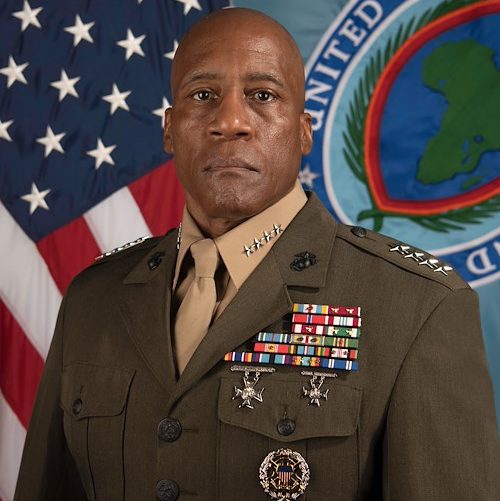By: Chioma Madonna Ndukwu
General Michael Langley, Commander of the United States Africa Command (AFRICOM), has issued a strong warning over the increasing efforts of terrorist groups operating in the Sahel to expand their reach toward West Africa’s coastal countries.
Speaking during a press conference at the African Chiefs of Defence Conference held in Nairobi, Kenya, from May 28 to 29, Langley said recent developments across Nigeria, the Sahel, and the Lake Chad Basin reflect a growing security concern for both African and international communities.
He stressed that extremist groups, including factions linked to ISIS and Al-Qaeda, are actively working to secure access to coastal regions to support their operations through arms smuggling, human trafficking, and other illicit activities.
“The violence we are seeing—particularly the scale and brutality of attacks—is alarming,” Langley said. “We’re observing increased aggression from extremist groups in the Lake Chad Basin and parts of Nigeria. Their aim now includes gaining access to the West African coast, which would dramatically enhance their ability to move funds, weapons, and people.”
According to the 2025 Global Terrorism Index, the Sahel region accounted for 19% of terrorist attacks worldwide and over 50% of all terrorism-related deaths in 2024. Five of the 10 most impacted countries globally are located in the region.
Langley warned that this growing threat not only destabilizes Africa but could also have consequences for U.S. national security.
“If these groups establish themselves on the coast, the implications will extend beyond the continent,” he added.
He called on frontline coastal states such as Ghana, Côte d’Ivoire, and Benin to strengthen their border defences and praised their current efforts to repel incursions from the north.
“Our coastal partners are actively securing their borders,” Langley noted. “AFRICOM is committed to supporting them in this effort.”
While acknowledging that the reduction of U.S. military presence in some African regions has limited direct oversight, Langley reaffirmed Washington’s commitment to maintaining close ties and supporting counterterrorism efforts through joint exercises, training, and intelligence cooperation.
He pointed to his November 2024 visit to Nigeria as an example of ongoing collaboration, saying, “We continue to work side by side with Nigerian defence leaders to combat threats from Boko Haram and ISIS West Africa.”
Langley also addressed U.S. efforts to maintain communication with countries like Burkina Faso, despite diplomatic challenges, emphasizing the importance of keeping engagement channels open.
“Even when relations are strained, the door remains open for cooperation,” he said, noting that Burkina Faso’s defence chief was invited to the Nairobi summit.
Turning to East Africa, Langley revealed that AFRICOM had intensified its operations in Somalia, conducting over 25 airstrikes so far in 2025—twice the number from the previous year—targeting extremist strongholds at the request of the Somali government.
He commended African nations for taking ownership of their security, stating that the continent’s militaries are increasingly proactive in addressing regional threats without waiting for foreign intervention.
“African forces are stepping up and showing leadership in their own defence. This is the kind of partnership we want to build on,” Langley said.
He stressed that AFRICOM’s role is to support—not replace—African efforts, adding that the U.S. approach is focused on building resilience, capacity, and long-term cooperation.
“Our strategy is rooted in the principle of ‘peace through strength,’” he concluded. “Stronger partnerships make all of us safer, and empowering African nations to solve their own security challenges is in everyone’s best interest.”


